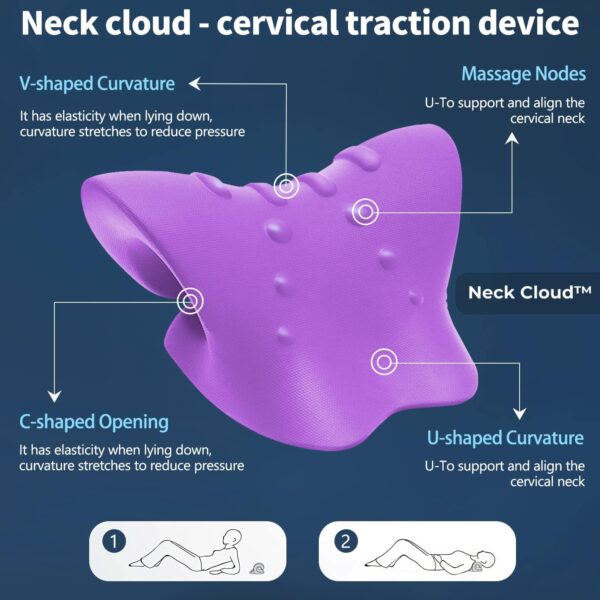Why the Neck Cloud is a Must-Have for Alleviating Neck Tension
Why the Neck Cloud is a Must-Have for Alleviating Neck Tension
Blog Article
The Effect of Tension on Neck Discomfort: Approaches for Decreasing Tension and Discomfort
In today's hectic world, it's no secret that anxiety has ended up being a common factor in the beginning and worsening of neck discomfort. Join us on a journey to unravel the impact of anxiety on neck pain and find effective ways to reduce pain and enhance general quality of life.
Understanding Stress-Related Neck Pain
Stress-related neck pain can materialize as tension, tightness, or discomfort in the neck and shoulder area. The link between stress and anxiety and neck discomfort lies in the body's physiological feedback to stress, which can result in muscle stress and rigidity in the neck muscle mass.

Identifying Common Tension Locations
Regularly experienced by people under anxiety, stress locations in the body can provide valuable understandings into the physical manifestations of mental pressure. One usual tension location is the neck, where tension usually materializes literally. Tension frustrations, rigid neck muscle mass, and limited variety of movement prevail signs and symptoms of stress-related neck stress. The shoulders are another common location where stress builds up. Anxiety can create the muscular tissues in the shoulders to tighten, bring about discomfort and discomfort. Additionally, the upper back is prone to tension accumulation, especially in people that experience chronic stress and anxiety. Poor stance and long term resting can aggravate tension in this location. The jaw is also a common place for stress-related tension, as lots of people clinch their jaw or grind their teeth when stressed. Recognizing these common tension areas can help individuals recognize the physical indicators of anxiety and take steps to address them before they rise into chronic discomfort or pain.
Carrying Out Relaxation Techniques
To successfully manage stress-related tension in the body, carrying out leisure techniques is critical. Leisure methods are useful tools for lowering neck discomfort triggered by stress. Deep breathing exercises can aid relax the mind and relax tense muscular tissues in the neck and shoulders (neck cloud). Practicing mindfulness meditation can also be advantageous in alleviating anxiety and advertising relaxation. Progressive muscular tissue relaxation, where you systematically strained and after that kick back different muscular tissue teams, can launch built-up stress in the neck area. Additionally, activities like yoga exercise and tai chi include both physical activity and relaxation, making them effective techniques for lowering stress and neck discomfort. Taking regular breaks throughout the day to stretch and unwind can stop muscle mass rigidity and stress from building up. By incorporating these relaxation strategies into your day-to-day routine, you can help handle stress degrees, minimize tension in the neck, and reduce pain linked with stress-induced neck discomfort.
Incorporating Self-Care Practices
Integrating self-care methods is important for preserving total health and handling stress-related neck pain properly. Involving in routine physical activity, such as mild extending exercises or yoga, can assist ease stress in the neck and shoulders. Practicing great stance throughout the day and taking frequent breaks from prolonged sitting or display look at this now time can also avoid stress on the neck muscular tissues.
Additionally, focusing on adequate rest and developing a regular sleep routine can add significantly to reducing anxiety degrees and promoting leisure. Developing a soothing bedtime routine, such as reading a publication or taking a warm bathroom, can aid prepare the mind and body for relaxed rest. In addition, maintaining a well balanced diet plan abundant in nutrients and staying moistened can sustain general wellness and lower inflammation that may intensify neck pain.
Integrating mindfulness methods, such as deep breathing workouts or meditation, can help handle tension and promote leisure. Taking time for oneself, taking part click here to read in hobbies, and setting limits to safeguard individual time are additionally crucial elements of self-care that can add to decreasing anxiety and alleviating neck discomfort.
Looking For Expert Assistance
Exactly how can people effectively resolve persistent neck pain that is impacting their day-to-day life and health? Seeking expert help can be an important action in managing and reducing neck pain.
Chiropractic specialists concentrate on back adjustment methods to improve placement and minimize stress in the neck location. Physiotherapists use targeted stretches and workouts to enhance muscular tissues, enhance adaptability, and boost general neck feature. Orthopedic experts can provide advanced clinical treatments such as shots or surgical options for extreme situations of neck pain.
Verdict

Stress-related neck pain can show up as tension, stiffness, or discomfort in the neck and shoulder location. The link between stress and neck discomfort lies in the body's physical reaction to stress, which can result in muscular tissue tension and rigidity in the neck muscles. Stress headaches, stiff neck muscles, and restricted range of motion are typical symptoms of stress-related neck tension. By including these relaxation techniques into your everyday regimen, you can assist handle stress levels, minimize stress in the neck, and minimize pain associated with stress-induced neck pain.

Report this page